- Home
- P. D. James
The Skull Beneath the Skin Page 2
The Skull Beneath the Skin Read online
Page 2
They faced each other across Bernie’s desk. His eyes, gray and keen, inspected her face as if he were an examiner and she a candidate, which in a way she supposed she was. Their sudden, direct and glittering stare, in contrast to the spasmodically grimacing mouth, was disconcerting. He said: “Why do you call yourself Pryde’s?”
“Because the Agency was set up by an ex-Metropolitan policeman, Bernie Pryde. I worked for him for a time as his assistant and then he made me his partner. When he died he left the Agency to me.”
“How did he die?”
The question, sharp as an accusation, struck her as odd, but she answered calmly.
“He cut his wrists.”
She didn’t need to close her eyes to see again that remembered scene, garish and sharply outlined as a cinema still. Bernie had lain slumped in the chair in which she now sat, his half-clenched right hand close to the open cut-throat razor, his shrunken left hand, with its scored and gaping wrist, resting palm upwards in the bowl like some exotic sea anemone glimpsed in a rock pool, curling in death its pale and wrinkled tentacles. But no rock pool had ever been so brightly pink. She could smell again the sickly-sweet insistent odour of freshly spilt blood.
“Killed himself, did he?”
His tone lightened. He might have been a golfing partner congratulating Bernie on a well-placed putt, while his quick glance round the office suggested that the action had been in all the circumstances entirely reasonable.
She had no need to see either room through his eyes. What she saw through her own was depressing enough. She and Miss Maudsley had redecorated her office together, painting the walls pale yellow to give an impression of greater light and cleaning the faded carpet with a proprietary liquid; it had dried patchily so that the final impression reminded her of diseased skin. With its newly-washed curtains, the room at least looked clean and tidy, too tidy since the absence of clutter suggested no great pressure of work. Every surface was crammed with plants. Miss Maudsley had green fingers and the cuttings she had taken from her own plants and lovingly tended in a variety of oddly shaped receptacles picked up during her forays in the street markets had flourished despite the poor light. The resulting rampant greenery suggested that it had been cunningly deployed to conceal some sinister defect in the structure or décor. Cordelia still used Bernie’s old oak desk, could still imagine that she could trace the outline of the bowl in which he had bled away his life, could still identify one particular stain of spilt blood and water. But then there were so many rings, so many stains. His hat, with its upturned brim and grubby ribbon, still hung on the curved wooden coatstand. No jumble sale would take it and she found herself unable to throw it away. Twice she had taken it as far as the dustbin in the back yard but had been unable to drop it in, finding this final symbolic rejection of Bernie even more personal and traumatic than the exclusion of his name from the name plaque. If the Agency did finally fail—and she tried not to think what the new rent would be when the lease came up for renewal in three years’ time—she supposed that she would still leave the hat hanging there in its pathetic decrepitude for unknown hands to toss with fastidious distaste into the wastepaper basket.
The tea arrived. Sir George waited until Miss Maudsley left. Then, measuring milk carefully into his cup, drop by drop, he said: “The job I’m offering is a mixture of functions. You’d be part bodyguard, part private secretary, part investigator and part—well, nursemaid. A bit of everything. Not everyone’s cup of tea. No knowing how it may turn out.”
“I’m supposed to be a private investigator.”
“No doubt. Shouldn’t be too purist in these times. A job’s a job. And you could find yourself involved in detection, even in violence, although it doesn’t seem likely. Unpleasant but not dangerous. If I thought there was any real risk to my wife or to you I wouldn’t be employing an amateur.”
Cordelia said: “Perhaps you could explain what, exactly, you want me to do.”
He frowned into his tea as if reluctant to begin. But when he did his account was lucid, concise and unhesitating.
“My wife is the actress Clarissa Lisle. You may have heard of her. Most people seem to know of her although she hasn’t worked much recently. I am her third husband and we married in June 1978. In July 1980 she was employed to play Lady Macbeth at the Duke of Clarence Theatre. On the third night of the advertised six-month run she received what she saw as a death threat. These threats have continued intermittently ever since.”
He began sipping his tea. Cordelia found herself gazing at him with the anxiety of a child hoping that her offering is acceptable. The pause seemed very long. She asked: “You said that she saw the first note as threatening. Are you implying that its meaning was ambiguous? What form exactly do these threats take?”
“Typewritten notes. Variety of machines by the look of it. Each communication surmounted by a small drawing of a coffin or a skull. All are quotations from plays in which my wife has appeared. All the quotations deal with death or dying: the fear of death, the judgement of death, the inevitability of death.”
The reiteration of that numinous word was oppressive. But surely it was in her imagination that he twisted it on his lips with mordant satisfaction? She said: “But they don’t specifically threaten her?”
“She sees this harping on death as threatening. She’s sensitive. Actresses have to be I suppose. They need to be liked. This isn’t friendly. I have the notes here, the ones she kept. The first ones were thrown away. You’ll need the evidence.”
He unclicked the briefcase and took out a stout manilla envelope. From it he spilled a heap of small sheets of paper and began spreading them over the desk. She recognized the type of paper at once; it was a popular, medium-quality, white writing paper sold over thousands of stationery counters in three sizes with envelopes to match. The sender had been economical and had selected the smallest size. Each sheet bore a typed quotation surmounted by a small drawing about one inch high of either an up-ended coffin with the initials R.I.P. on the lid or a skull with two crossbones. Neither had required much skill; they were emblems rather than accurate representations. On the other hand, they were drawn with a certain sureness of line and decorative sense which suggested some facility with the pen or, in this case, with a black-tipped ballpoint. Under Sir George’s bony fingers the white slips of paper with their stark black emblems shifted and rearranged themselves like the cards for some sinister game—hunt the quotation, murderer’s snap.
Most of the quotations were familiar, words which would readily come to the mind of anyone reasonably well read in Shakespeare and the Jacobeans who chose to ponder on references in English drama to death and the terror of dying. Even reading them now, truncated and childishly embellished as they were, Cordelia felt their potent and nostalgic power. The majority of them were from Shakespeare and the obvious choices were there. The longest by far—and how could the sender have resisted it?—was Claudio’s anguished cry from Measure for Measure:
Ay, but to die, and go we know not where
To lie in cold obstruction and to rot;
This sensible warm motion to become
A kneaded clod; and the delighted spirit
To bathe in fiery floods; or to reside
In thrilling region of thick-ribbèd ice;
To be imprisoned in the viewless winds,
And blown with restless violence round about
The pendant world! …
The weariest and most loathèd worldly life
That age, ache, penury and imprisonment
Can lay on nature, is a paradise
To what we fear of death.
It was difficult to interpret that familiar passage as a personal threat; but most of the other quotations could be seen as more directly intimidating, hinting, she thought, at some retribution for real or imagined wrongs.
He that dies pays all debts.
Oh, thou weed!
Who art so lovely fair and smell’st so sweet
Th
at the sense aches at thee, would thou hadst ne’er been born!
Some care had been taken in the choice of illustration. The skull adorned the lines from Hamlet—
Now get you to my lady’s chamber, and tell her, let her paint an inch thick, to this favour she must come
—as it did a passage which Cordelia thought might be from John Webster, although she couldn’t identify the play.
Being heretofore drown’d in security,
You know not how to live, nor how to die;
But I have an object that shall startle you,
And make you know whither you are going.
But, even allowing for the sensitivity of an actress, it would take a fairly robust egotism to wrench these familiar words from their contexts and apply them to oneself; that, or a fear of dying so strong as to be morbid. She took a new notebook from her desk drawer and asked: “How do they arrive?”
“Most come by post in the same type of envelope as the paper and with the address typed. My wife didn’t think to keep any of the envelopes. A few were delivered by hand either at the theatre or at our London flat. One was pushed under the dressing-room door during the run of Macbeth. The first half dozen or so were destroyed—best thing to do with them all in my view. These twenty-three are all we now have. I’ve numbered them in pencil on the back in the order of receipt as far as my wife can remember and with information about when and how each was delivered.”
“Thank you. That should be helpful. Your wife has played a great deal of Shakespeare?”
“She was a member of the Malvern Repertory Company for three years after she left drama school and played a fair amount then. Less in recent years.”
“And the first of these—which she threw away—came when she was playing Lady Macbeth. What happened?”
“The first one was upsetting, but she told no one about it. Thought it was an isolated bit of malice. She says she can’t remember what it said, only that it had the drawing of a coffin. Then a second came and a third and fourth. During the third week of the season my wife kept breaking down and had to be continually prompted. On the Saturday she ran off the stage during the Second Act and her understudy had to take over. It’s all a matter of confidence. If you think you’re going to dry up—drying is the theatrical jargon I believe—then you dry. She was able to return to the part after a week but it was a struggle to get through the six weeks. After that she was due to appear at Brighton in a revival of one of those thirties murder mysteries, the sort where the ingénue is called Bunty, the hero is Clive and all the men wear long tennis flannels and keep dashing in and out of French windows. Curious affair. Not exactly her kind of part, she’s a classical actress, but there aren’t a lot of opportunities for middle-aged women. Too many good actresses chasing too few parts, so they tell me. Same thing happened. The first quotation appeared on the morning the play opened and they came at regular intervals thereafter. The play came off after four weeks and my wife’s performance may have had something to do with it. She thought so. I’m not so sure. It was a stupid plot, couldn’t make sense of it myself. Clarissa didn’t act again until she accepted a part in Webster’s The White Devil, at Nottingham, Victoria something or other.”
“Vittoria Corombona.”
“Was that it? I was in New York for ten days and didn’t see it. But the same thing happened. The first note arrived again on the day the play opened. This time my wife went to the police. Not much joy. They took the notes away, thought about them and brought them back. Sympathetic but not very effective. Made it obvious that they didn’t take the death threat seriously. Pointed out that if people are serious about killing, they do it, they don’t just threaten. Must say, that was rather my view. They did discover one thing, though. The note which arrived while I was in New York was typed on my old Remington.”
Cordelia said: “You still haven’t explained how you think I can help.”
“Coming to that. This weekend my wife is to play the leading role in an amateur production of The Duchess of Malfi. The play is to be given in Victorian dress and will take place on Courcy Island about two miles off the Dorset coast. The owner of the island, Ambrose Gorringe, has restored the small Victorian theatre which was first built by his great-grandfather. I understand that the original Gorringe, who rebuilt the ruined medieval castle, used to entertain the Prince of Wales and his mistress, the actress Lillie Langtry, and the guests used to amuse themselves with amateur theatricals. I suppose the present owner is trying to restore past glories. There was an article in one of the Sunday papers about a year ago describing the island, the restoration of the castle and theatre. You may have seen it.”
Cordelia couldn’t recall it. She said: “And you want me to go to the island and be with Lady Ralston?”
“I hoped to be there myself but that won’t be possible. I have a meeting in the West Country which I can’t miss. I propose to motor down to Speymouth with my wife early Friday morning and take leave of her at the launch. But she needs someone with her. This performance is important to her. There’s to be a revival of the play at Chichester in the spring and if she can regain her confidence she might feel that she can do it. But there’s more to it than that. She thinks that the threats may come to a head this weekend, that someone will try to kill her on Courcy Island.”
“She must have some reason for thinking that.”
“Nothing that she can explain. Nothing that would impress the police. Not rational, perhaps. But that’s what she feels. She asked me to get you.”
And he had come to get her. Did he always procure for his wife whatever she wanted? She asked again: “What precisely am I being employed to do, Sir George?”
“Protect her from nuisance. Take any telephone calls which come for her. Open any letters. Check the set before the performance if you get the chance. Be on call at night; that’s when she’s most nervous. And bring a fresh mind to the question of the messages. Find out, if you can in just three days, who is responsible.”
Before Cordelia could respond to these concise instructions there came again that disconcerting pierce of gray from under the discordant brows.
“D’you like birds?”
Cordelia was temporarily nonplussed. She supposed that few people, except those afflicted with a phobia, would admit to not liking birds. They are, after all, one of the most graceful of life’s fragile diversions. But she supposed that Sir George was covertly inquiring whether she could recognize a marsh harrier at fifty yards. She said cautiously: “I’m not very good at identifying the less common species.”
“Pity. The island’s one of the most interesting natural bird sanctuaries in Great Britain, probably the most remarkable of those in private hands, almost as interesting as Brownsea Island in Poole Harbour. Very similar, come to think of it. Courcy has as many rare birds; the blue-eared and Swinhold pheasants as well as Canada geese, black godwits and oyster catchers. Pity you’re not interested. Any questions—about the case I mean?”
Cordelia said tentatively: “If I’m to spend three days with your wife, ought she not to interview me before any decision is made? It’s important that she feels she can trust me. She doesn’t know me. We haven’t even met.”
“Yes you have. That’s how she knows she can trust you. She was having tea with a Mrs. Fortescue last week when you returned the Fortescue cat—Solomon, I think the brute’s called. Apparently you found him within thirty minutes of beginning the search so your bill was correspondingly small. Mrs. Fortescue is devoted to the animal. You could have charged treble. She wouldn’t have queried it. That impressed my wife.”
Cordelia said: “We’re rather expensive. We have to be. But we are honest.”
She remembered the drawing room in Eaton Square, a feminine room if femininity implies softness and luxury; a cluttered, cosy repository of silver-framed photographs, an overlavish tea on a low table in front of the Adam fireplace, too many flowers conventionally arranged. Mrs. Fortescue, incoherent with relief and joy, had introd
uced her guest to Cordelia as a matter of form but her voice, muffled in Solomon’s fur, had been indistinct and Cordelia hadn’t caught the name. But the impression had been definite. The visitor had sat very still in her armchair beside the fireplace, one thin leg thrown over the other, heavily ringed hands resting on the arms. Cordelia recalled yellow hair intricately piled and wound above a tall forehead, a small, bee-stung mouth and immense eyes, deep-set but with heavy, almost swollen, lids. She had seemed to impose on the lush conformity of the room a hieratic and angular grace, a distinction which, despite the plainness of the formal suede suit, hinted at some histrionic or eccentric individuality. She had gravely bent her head and watched her friend’s effusions with a half-mocking smile. Despite her stillness there had been no impression of peace.
Cordelia said: “I didn’t recognize your wife but I remember her very well.”
“And you’ll take the job?”
“Yes, I’ll take it.”
He said without embarrassment: “Rather different from finding lost cats. Mrs. Fortescue told my wife what you charge per day. This will be higher, I suppose.”
Cordelia said: “The daily rate is the same whatever the job. The final bill depends on the time taken, whether I have to use either of my staff, and the level of expenses. These can sometimes be high. But as I’ll be a guest on the island, there will be no hotel bills. When do you want me to arrive?”
“The launch from Courcy—it’s called Shearwater—will be at Speymouth jetty to meet the nine-thirty-three from Waterloo. Your ticket’s in this envelope. My wife has telephoned to let Mr. Gorringe know that she’s bringing a secretary-companion to help her with various odd jobs during the weekend. You’ll be expected.”

 The Skull Beneath the Skin
The Skull Beneath the Skin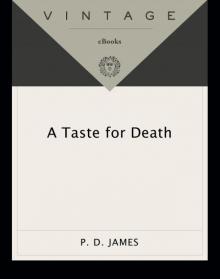 A Taste for Death
A Taste for Death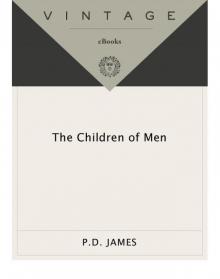 The Children of Men
The Children of Men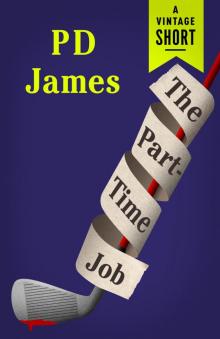 The Part-Time Job
The Part-Time Job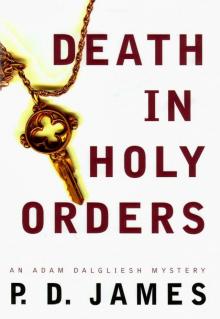 Death in Holy Orders
Death in Holy Orders The Victim
The Victim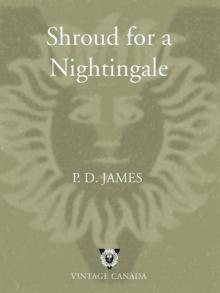 Shroud for a Nightingale
Shroud for a Nightingale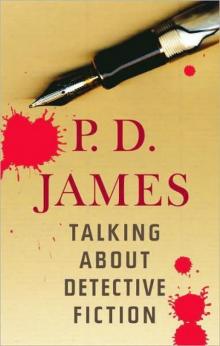 Talking about Detective Fiction
Talking about Detective Fiction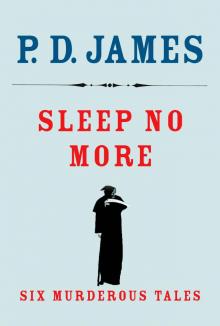 Sleep No More
Sleep No More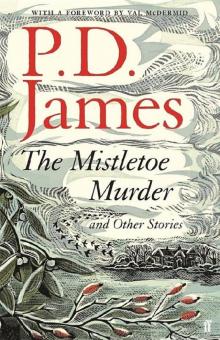 The Mistletoe Murder and Other Stories
The Mistletoe Murder and Other Stories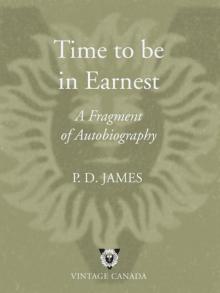 Time to Be in Earnest
Time to Be in Earnest Original Sin
Original Sin A Mind to Murder
A Mind to Murder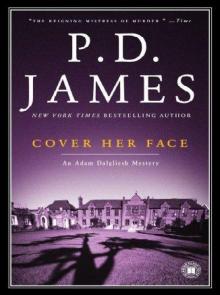 Cover Her Face
Cover Her Face Innocent Blood
Innocent Blood Devices and Desires
Devices and Desires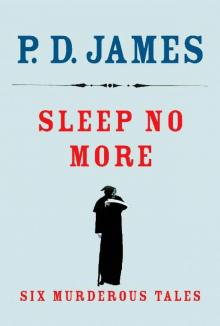 Sleep No More: Six Murderous Tales
Sleep No More: Six Murderous Tales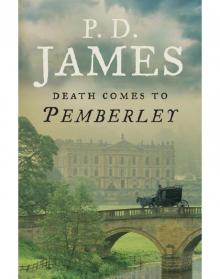 Death Comes to Pemberley
Death Comes to Pemberley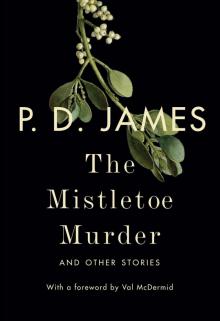 The Mistletoe Murder
The Mistletoe Murder Death of an Expert Witness
Death of an Expert Witness The Private Patient
The Private Patient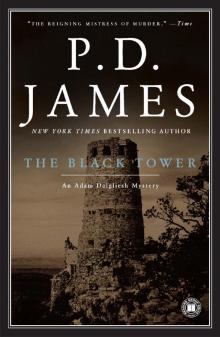 The Black Tower
The Black Tower Devices & Desires - Dalgleish 08
Devices & Desires - Dalgleish 08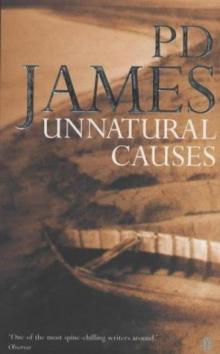 Unnatural Causes
Unnatural Causes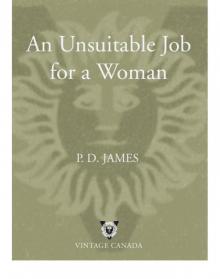 An Unsuitable Job for a Woman
An Unsuitable Job for a Woman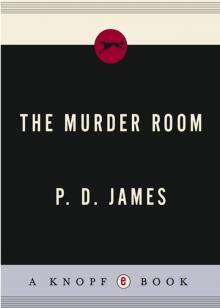 The Murder Room
The Murder Room A Certain Justice
A Certain Justice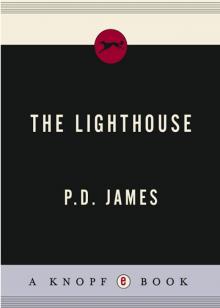 The Lighthouse
The Lighthouse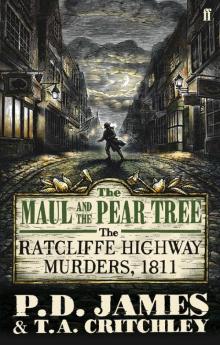 The Maul and the Pear Tree
The Maul and the Pear Tree